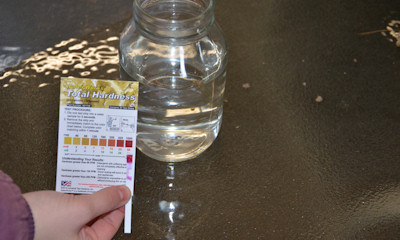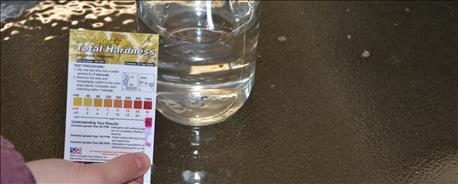
Fred Whitford says water quality that you put in the tank to spray herbicides is a big deal. If the water is hard, certain herbicides won’t be as effective. Glyphosate is the classic, but there are many others that are affected by hard water. If you don’t test for it and correct it if necessary, you may not see the weed control you like. And you may blame it on weed resistance, using the wrong rate, spraying at the wrong time of day - everything but the real cause - hard water.

NOW THAT'S HARD WATER! Water at Tom Bechman’s small farm comes from a well. It maxed out the color chart for hardness at 1,000 parts per million.
Whitford is the Purdue University director of pesticide programs. To find out if hard water is an issue in central Indiana, specifically at my place, I got online, found water test kits, and ordered one to test hardness, and one to test pH of the water. You can buy kits consisting of litmus strips and color comparison charts that do both hardness and pH on the same card. However, I was pretty sure my water was hard. Most of the combo-test only went up to 400 parts per million on hardness. So I ordered a separate one that went to 1,000 parts per million.
After testing my well water, I called Whitford. Here’s how the conversation went.
Bechman: Fred, this is Tom Bechman. I tested my water for hardness like you said.
Whitford: Did you buy a simple litmus strip kit that tests pH too?
Bechman: Well, I bought a pH kit but it was separate. I wanted to test for higher hardness levels than I could find on a card that also did pH on the same card.
Whitford: Most of those go up to 400 parts per million of hardness. Why did you think you needed to go higher?
Bechman: Because my wife tells me that when the water softener doesn’t work, our water is super hard. How she can tell, I don’t know. I can’t tell the difference.
Whitford: The hardness interferes with soaps and shampoos. That’s where you can usually tell first.
Bechman: The Culligan man also said it was very hard when he tested it.
Whitford: Well, just how hard is it? Is it 400 or 500 ppm? That’s pretty hard, and that’s what a lot of water in Indiana is like.
Bechman: Oh, it’s way harder than that. It matched up to the 1,000 ppm, or maybe even was darker than the color representing 1,000 ppm.
Whitford: Wow! That’s hard water! Are you sure?
Bechman: Yes, I’m sure. You want me to send it to you?
Whitford: Yes, email me a picture of the strip if you have one left.
(I just happened to still have a strip, and sent him a picture. Whitford called back. )
Whitford: OK, Tom, you’re exactly right. That is about as hard as I’ve seen.
Bechman: Does that mean I shouldn’t use it for spraying?
Whitford: No, it just means that you would need to add the maximum rate of conditioner. Liquid products are available, but we recommend ammonium sulfate, especially for very hard water. Trust me, that’s very hard water! You would want to add 17 pounds of dry ammonium sulfate per 100 gallons of spray water. And you wouldn’t want to cut rates either. What hard water does is tie up active ingredient molecules so effectively, you’re applying a lower rate.
Bechman: Well, I’ve got to go, Fred. My wife just came in, saying the drinking water in the house is hard. The conditioner must not be working. I can’t tell, but she can!
Whitford: Good luck, Tom!
Now that’s hard water! Water at Tom Bechman’s small farm comes from a well. It maxed out the color chart for hardness at 1,000 parts per million.
About the Author(s)
You May Also Like




